
Roland de Szoeke
1946-2025
Professor Emeritus Roland de Szoeke died in December, 2025. Dean Tuba Özkan-Haller sent out the following notice.
Roland was a physical oceanographer, and his interests and contributions were centered around ocean circulation dynamics, from the smallest, turbulent scales to the largest, global scales. He was primarily a theoretician, with a deep knowledge of mathematical physics, but always judged a theory by its ability to explain and give insight into ocean physics and fluid dynamics. In collaboration with his college colleagues, he made seminal contributions to the understanding of westward-propagating variability observed in early satellite altimeter measurements of sea-surface height. He will always be remembered by his colleagues, students and postdocs as a very kind, gentle, considerate, and generous person with a calm presence and a ready smile.
A Tribute to Roland and a reception after will be held on Tuesday March 10, 2026 at 3:30 p.m. in Burt 193. The major scientific speakers will be Lynne Talley (SIO) and Roger Samelson (OSU).
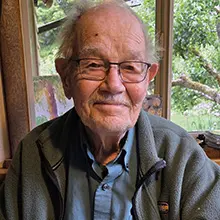
William G. Pearcy
1929-2025
Professor Emeritus William (Bill) Pearcy died in November, 2025. He was at home where he wished to be, with his son Mark present. Read Bill's obituary, in his own words.
The following biography appears on the Oregon State University Special Collections and Archives Research Center site.
William G. Pearcy joined the faculty of Oregon State University in 1960 as a biological oceanographer in the newly established Oceanography Department. Pearcy's research on Pacific salmon, deep-sea fish biology, squid, and trace metals in the marine food chain resulted in more than 150 scientific papers and the 1992 book, Ocean Ecology of North Pacific Salmonids. Of special note is Pearcy's research on the causes of declining salmon stock. Pearcy retired from Oregon State University in 1990, but maintained an active research program through the 1990s. He received the Oscar Elton Sette Award in 1995 and the Pacific Marine Sciences Organization Wooster Award in 2003. Pearcy earned his BS and MS degrees at Iowa State University and his Ph.D. at Yale University. Bill Pearcy participated in some of the first submersible dives off the Pacific Northwest coast.
Keith W. Muckleston
1932-2025
Professor Emeritus Keith Way Muckleston passed away in October, 2025 at the age of 93. He died peacefully with family. Keith was an expert in Water Resource Geography and worked on many management issues in the region, including the Willamette and Fern Ridge reservoir systems as well as the international management in the Columbia River system. CEOAS professor Aaron Wolf said about Keith, "He was a good man who was generous with his time and expertise, and who loved the educational mission and the Pacific Northwest."
Josiah Chan
September, 2025
We are saddened at the passing of Josiah Chan, a technician in Pam Sullivan's lab. Of Josiah, Pam wrote, “Josiah will be remembered for the joy he brought to the Sullivan Lab, OSU community, and beyond, and his willingness and ability to get the job done with humor, kindness, and friendship. Josiah had a tremendous impact on the science we conduct and will be deeply missed.”
Logos Public Charter School's Post: In Loving Memory of Josiah Chan (Class of 2020)
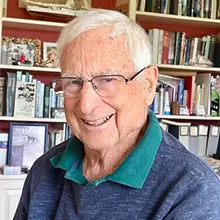
Andrew (Drew) Galbraith Carey, Jr.
1932-2025
Professor Emeritus Andrew (Drew) Carey passed away in the spring of 2025 at the age of 93. He was a biology major at Princeton (1951-55) and received a Ph.D. in zoology-marine ecology from Yale (1956-61). After graduate school, Drew accepted a professorial position at Oregon State University, where he taught from 1961-1987. He published 40 papers on his research, specializing in the ecology of invertebrate animal communities and the continental shelf to the abyssal plain in the NE Pacific and Arctic Oceans. Drew taught graduate school and led many research expeditions to the Arctic. He also studied hydrothermal vents off of the Oregon Coast using a naval research submersible.
Read more about Drew in The Cape Cod Chronicle: Andrew (Drew) Galbraith Carey, Jr.
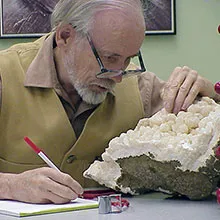
Edward M. Taylor
1933-2024
Professor Emeritus Edward "Ed" Morgan Taylor, age 90, passed away in his sleep on November 15, 2024 in Benton County. He was born as Edward Burton Morgan in Rapid City, South Dakota on December 27. 1933. After his parents separated in 1934, he was adopted by his Aunt Estelle and uncle Edward Taylor, living in Salem, Oregon until moving to Corvallis in 1939. Ed Attended grades one through twelve in the Corvallis School system, became very active in the Boy Scouts of America, and in outdoor living in the adjacent Coast Range and Cascade Mountains. He enrolled as a 1953 freshman at what was then called Oregon State College (which became Oregon State University in 1961). Ed earned his B.S. degree and M.S. in Geology at Oregon State. After earning his Ph.D. in Geology at Washington State University in 1967, he returned to Corvallis as a member of the OSU Geology faculty. Ed’s career at OSU lasted for 32 years during which time he taught many different subjects including mineralogy, crystallography, petrology, volcanology, optical minerology, field geology, and Geology of Oregon. He designed and directed construction of a building containing a kitchen, study hall, and bathrooms for students in the OSU summer Field Geology Program for which he had been an instructor for 39 years at Mitchell in Central Oregon. See Obituary for Edward Taylor for more information about Ed, his career, and family.
According to Anita Grunder, "He was appreciated for his dedication to teaching Geology, particularly mineralogy and field camp and has a legacy of loyal alumni. His research was focused on the Oregon Cascades. Many came to a fine celebration of his 90th birthday in Seaside last February [2024]."
See the collection of crystals and minerals which was curated for many years by Ed, who took the photos.
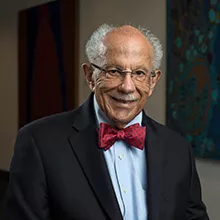
Warren M. Washington
1936-2024
Warren M. Washington, illustrious and accomplished Oregon State CEOAS alumnus, died October 18, 2024. Washington earned his bachelor’s degree in physics and his master’s degree in general science at Oregon State. He went on to Pennsylvania State University, where he became the second African American in the nation to complete a doctorate in atmospheric sciences. Washington received an honorary doctorate from Oregon State in 2006 and the OSU College of Science’s Lifetime Achievement in Science Award in 2019. Among many other honors, Washington was co-awarded the 2019 Tyler Prize for Environmental Achievement – often referred to as the “Nobel Prize for the Environment” – along with climate change expert Michael Mann. In 2010, President Barack Obama honored Washington’s achievements with the National Medal of Science. See also Climate science pioneer extends legacy with scholarship gift and Warren Washington, Groundbreaking Climate Scientist, Dies at 88.
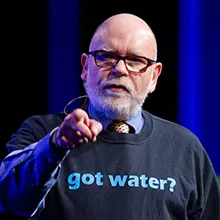
Michael Campana
1948-2024
Dr. Michael Campana, emeritus Professor of Geography, passed away on August 25 from injuries sustained in an automobile accident. He came to OSU in 2009 to direct the Institute for Water and Watersheds after a long and successful career at the University of New Mexico’s Water Resources Program. He received a doctorate in hydrology from the University of Arizona, and conducted extensive research on water resources internationally — notably in Central America, the South Caucusus, and Central Asia — as well as on transboundary water resource issues, water allocation and availability, and related topics. Michael served on a number of federal research committees, was chair of the 10,000-member Association of Ground Water Scientists and Engineers, and participated in many other national and international water research and management initiatives. He spent many years in service to the American Water Resources Association (AWRA), serving as president-elect, then as president. He was also the Technical Editor for the journal Impact published by the AWRA. He received numerous awards and honors in his lifetime, including the International Service Award from the US Chapter of the International Association of Hydrogeologists for outstanding international contributions in hydrogeology (2015) and the President's Award for Excellence from the AWRA (2019).
Importantly, Michael coined the term “hydrophilanthropy" to describe his philanthropic efforts to improve water resources in developing countries, work that was dedicated to the memory of his sister Ann Campana Judge, who was killed in the September 11, 2001 attacks. He and his wife Mary Frances have generously sponsored a scholarship at the OSU Foundation that assisted numerous students in the Water Resources Graduate Program, including several students in the Water Cooperation and Diplomacy degree program who would not have been able to participate in the program and earn their degrees without the Campana scholarship.
Michael advised many students on topics including transboundary groundwater resources; integrated and sustainable water resources management; water, sanitation and hygiene (WaSH) in developing regions; regional hydrogeology; science-policy interface; and communications. He maintained an active blog, WaterWired, about water resources matters. His deep and broad contributions earned him the nickname “aquadoc.” Many people involved in water resources around the world will miss him.
For contributions in memory of Michael, please see:
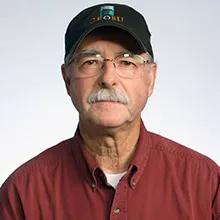
Philip L. Jackson
1946-2024
Philip L. Jackson, Professor Emeritus of Geography, passed away on April 3, 2024. He came to Oregon State University in 1978 after completing studies at Chico State University, Arizona State University, and the University of Kansas. His initial work was with the OSU Extension Service assisting communities developing policies to meet the requirements of Oregon’s newly introduced land use law. He subsequently transitioned to an academic appointment in the Department of Geography where he taught courses in climatology, land use, field research techniques, and agricultural geography while also serving as the department’s undergraduate internship coordinator.
Professor Jackson’s land use research combined remote sensing with field studies in a dual approach used to monitor environmental change. Sometimes the change was caused by forces of nature and other times the changes were caused by human activity. He was a popular mentor of students and served on well over one hundred graduate committees.
Phil was a regular contributor to the popular Atlas of the Pacific Northwest before taking over as Co-Editor for three editions. This best-selling publication of the OSU Press was used in classrooms and as a reference for the ever changing human and natural character of the states of Oregon, Washington, and Idaho.
Jackson’s last major work was a co-authored book titled A Rediscovered Frontier, in which he and Robert Kuhlken examined land use policy and development issues in what was coined the “New West.” The dominant resource extraction paradigm in much of western rural/small town U.S. was under challenge by a New West emphasis on environmental, scenic, recreation, amenity and tourism interests. Although Oregon’s statewide planning goals cover private land and urban growth development, much of the New West has yet to take such an approach.
Philip Jackson had an active life away from the university. He and his wife Pat were married for fifty-six years and had two sons, Ladd and Jamie. He was an outdoorsman who was a dedicated fisherman and avid hunter. As time allowed, he was active in both archery and shooting sports. In his passing, Phil leaves his family, friends, students and colleagues with the memories of a great man.
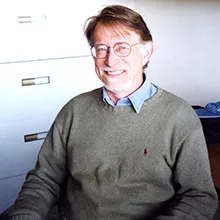
Steven K. Esbensen
1946–2024
Professor Emeritus Steven Kristian Esbensen, of Corvallis, Oregon passed away on Thursday, February 22, 2024. Steve was an OSU faculty member from 1977 until his retirement in 2003, after which he continued working part time until 2011. His research on air-sea interaction and tropical meteorology spanned scales ranging from the marine atmospheric boundary layer to global-scale atmospheric circulation. In 1981 with his Ph.D. student Yochanan Kushnir, Steve published the first global atlas of air-sea heat fluxes based on surface marine observations from ships and buoys. This was the standard source of data for ocean heat budget calculations for many years.
Academically, Steve spearheaded the establishment of the undergraduate and graduate degree programs in Environmental Sciences in 1992. As Chair of the Department of Atmospheric Sciences in the College of Science in 1992 and 1993, he worked closely with former Dean of the College of Oceanography, Doug Caldwell, to merge Atmospheric Sciences into what then became the College of Oceanic and Atmospheric Sciences.
Beyond his professional career, Steve was extensively involved in the Corvallis music community. He was President of Corvallis-OSU Piano International, Treasurer for the Chamber Music of Corvallis, and Treasurer and Secretary for the Chintimini Chamber Music Festival.
Steve was also active in local politics, serving multiple terms as a Precinct Committee Person. He attended many local and state political meetings and went door-to-door to get out the votes on the run-ups to many elections.
For all who had the good fortune to know him, Steve will be remembered for his collegiality and generosity as a teacher, mentor and fellow researcher, and for his kind and gentle spirit. He is survived by his wife Bonnie and their sons Peter and Adam.
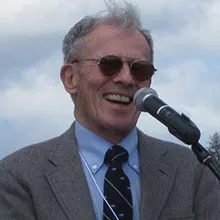
John V. Byrne
1928–2024
John V. Byrne, who served as Oregon State University’s 12th president from 1984 to 1995 after leading the National Oceanic and Atmospheric Administration, died on Thursday, January 11, 2024. He was 95.
In 1968, he was named chair of OSU’s oceanography department, and three years later he was promoted to dean of the newly created School of Oceanography, now known as the College of Earth, Ocean, and Atmospheric Sciences.
See "John V. Byrne, Oregon State’s 12th president, dies at age 95" for more information about President and Professor Emeritus John Byrne.
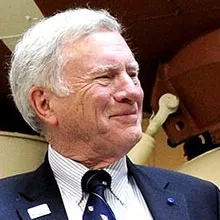
Don Walsh
1931–2023
Esteemed oceanographer Don Walsh was a courtesy professor of the College of Earth, Ocean, and Atmospheric Sciences. He was one of only three people to go to the bottom of the Mariana Trench—the deepest point of the world's oceans. Don was born on November 2, 1931 in Berkeley, California and died November 13, 2023. See his Wikipedia article, and read his obituary in the New York Times.
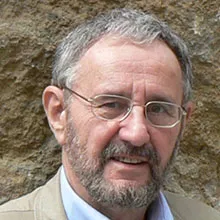
Erwin Suess
1939-2023
Erwin Suess passed away in his home in Corvallis on September 28 after a long battle with cancer. Erwin was an Associate and Full Professor at Oregon State University in the former School then College of Oceanography. He was recruited away from OSU in 1988 to be a Full Professor and later the Director of GEOMAR Helmholtz Centre for Ocean Research in Kiel, Germany. Upon retirement Erwin moved back to Corvallis. He was a courtesy Professor at CEOAS and active in marine science research until his passing. In 2023 he received overdue recognition being named an American Geophysical Union Fellow for his important discoveries affecting interpretation of paleo-productivity, sedimentology, and mineralogy, and for spearheading exploratory and interdisciplinary research on ocean cold-seeps and gas hydrates.
Erwin was well-loved by the many students and colleagues whom he inspired and mentored during his exemplary five-decade career. Those who knew him well have over the years told many stories of Erwin’s accomplishments, his love for sea-going work, for international travel, art, and music. Many have remarked that Erwin was an extraordinary marine geologist, a devoted husband to his wife Zona, a brilliant man with a remarkable life, a lovely and outstanding person, a real treasure.
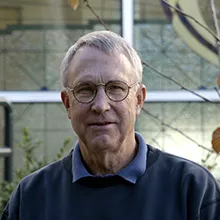
John S. Allen
See John's CEOAS profile page.
See John's obituary in the Bulletin of the American Meteorological Society, February, 2024.
View a recording of the John S. Allen Tribute event on Monday, October 23, 2023
In recognition of Professor Allen’s important contributions to physical oceanography, the John S. Allen Memorial Student Success Endowment in Physical Oceanography has been established in his memory. Thanks to the generosity of the oceanography community, this fund will support CEOAS students with an interest in physical oceanography. This flexible fund will be able to support student scholarships, sea-going experiences for students, other experiential learning opportunities, field work, conference attendance, and educational travel. This fund will exist in perpetuity to remember Professor Allen’s outstanding legacy.
To make a gift to this fund, visit the OSU Foundation's CEOAS support page and search for “John S. Allen Memorial Student Success Endowment in Physical Oceanography” in the “I want to give to” box.
You may also make a check out to OSU Foundation, and in the memo line please include “John S. Allen Memorial Student Success Endowment in Physical Oceanography” and mail the check to:
OSU Foundation
4238 SW Research Way
Corvallis, OR 97333
If you have question about the fund or questions about making a gift, please contact Allison Bauer at Allison.Bauer@osufoundation.org.
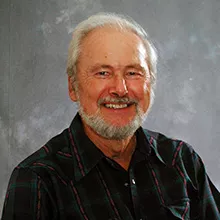
Bernd "Berni" Simoneit
1937–2023
Professor Emeritus Bernd "Berni" Simoneit, 85, of Corvallis, passed away on Sunday, July 23, 2023 in Corvallis. See Berni Rolf Simoneit and this article on The Geochemical Society website to learn more.

Paul Douglas Komar
1939–2023
Paul Douglas Komar, 85, of Corvallis, passed away on Wednesday, February 22, 2023. Paul was a faculty member at Oregon State University from 1970 until his retirement in 1998, after which he continued to contribute as an Emeritus Professor. Paul’s storied career covered myriad topics ranging from investigations into the impact of climate change on coastal hazards to sediment transport by floods on Mars. In the nearshore processes community, Paul is probably best known for his pioneering work on longshore sediment transport (with Doug Inman) and then for his highly influential textbook, "Beach Processes and Sedimentation" (Prentice Hall). Thousands of students around the world learned the fundamentals of waves and beaches from Paul and his unparalleled text. Paul’s depth of knowledge of nearshore processes, his wit, sense of humor, and story-telling were unique. A field trip to the Oregon coast with Paul was a true treat. Paul was a treasured mentor, colleague, and friend, and he will be greatly missed. Paul is survived by his wife Jan and his daughter Kristi.
Jefferson J. Gonor
1932–2022
Professor Emeritus Jefferson John Gonor Jr., age 89, of Corvallis, Oregon passed away on Wednesday, August 17, 2022. Jefferson was born November 8, 1932.
Obituary
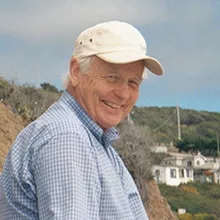
William Lawrence (“Larry”) Gates
1928–2022
Professor W.L. “Larry” Gates passed away in Hamburg, Germany on June 27 at the age of 93. William Lawrence Gates was born in Pasadena, California and received his B.S, M.S., and Ph.D. from the Massachusetts Institute of Technology (MIT), all in meteorology. His first employment outside the university was as a member (and later director) of the Numerical Prediction Project at the Air Force Cambridge Research Center in Massachusetts from 1953 to 1957. He then accepted an appointment as Assistant (and later Associate) Professor in the Department of Meteorology at University of California, Los Angeles (UCLA), where he remained until 1966 when he joined the RAND Corporation in Santa Monica as the Director of their Climate Program. In 1976 he became Professor and Chairman of the Department of Atmospheric Sciences (and founding Director of the Climatic Research Institute) at Oregon State University. Continuing to divide his career between research posts and academia, he returned to California in 1989 as the (founding) Director of the Program for Climate Model Diagnosis and Intercomparison (PCMDI) at the Lawrence Livermore National Laboratory, and later as the Director of the National Institute for Global Environmental Change at the University of California at Davis. Larry Gates is the author or co-author of more than 100 scientific papers and reports, and has been a member of numerous national and international panels, committees and working groups concerned with weather prediction and climate research. See Climate science just lost a visionary pioneer: Larry Gates to learn more.
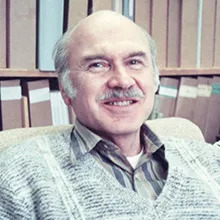
Louis Irwin Gordon
1928–2022
Associate Professor Emeritus Louis Irwin Gordon passed away June 25 at the age of 93. He earned his Ph.D. in Chemical Oceanography and then became an Associate Professor at OSU after an M.S. from Scripps. Lou mentored many students and contributed to the development of improved methods for the analysis of nutrients and gasses in seawater. Professor Emeritus Bob Collier wrote, "On March 11 and again on March 19, 1977, Lou Gordon dove to the seafloor with the submersible ALVIN discovering the Galapagos Hydrothermal vent field. He was part of one of the most important discoveries in the marine sciences (geology, biogeochemistry, hypotheses about the origins of life on earth). At the time, I was a mere graduate student on board, but developed a great respect for Lou – one that would influence my joining of the faculty at OSU as Lou's colleague. I enjoyed working with Lou for the rest of our mutual careers at OSU." Over the course of his career, Lou co-authored 59 publications and received 7959 citations. Senior Faculty Research Assistant Andy Ross further noted, “I worked for him as a sea-going chemist until his final retirement somewhere around 2006. He was always friendly, supportive and sharp as a tack when it came to all forms of chemistry. He was a very exacting individual and always strived to achieve the best accuracy and highest precision in all of our work – along with being a leading-edge thinker. He loved to experiment. He was also an international collaborator, inviting scientists from Israel and Oman to do research in our lab. We sailed multiple times together down in the Antarctic mostly on board R/V Nathaniel B. Palmer in the Ross Sea. He loved the adventure and was always happy to share stories from his younger days. He took his role as King Neptune seriously during our southern ocean crossing ceremonies. He was perfect for the part.” See Louis Irwin Gordon to read more.
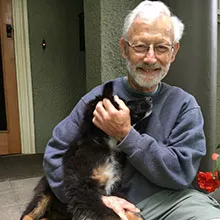
Shaul Levi
1942–2021
Professor Emeritus Shaul Levi with the College of Earth, Ocean and Atmospheric Sciences died December 6, shortly after his diagnosis of leukemia. He was attended by his wife Catherine and his son Boaz when he passed. Levi was born in Haifa, Israel. His parents were refugees from Nazi Germany, fleeing just before deportations to the concentrations camps began. Levi moved with his family to the United States when he was 15 years old. Levi graduated from high school in 1960 and earned a soccer scholarship to University of San Francisco where he played for the USF Dons. He graduated with a degree in physics from USF then attended UC Davis. Levi earned a Ph.D. in geophysics from the University of Washington and did post-doctoral research at the University of Minnesota. In 1977 Levi was hired as an assistant professor in the then College of Oceanography at Oregon State University. He loved Corvallis and enjoyed working at the university. See Shaul Levi to read more.
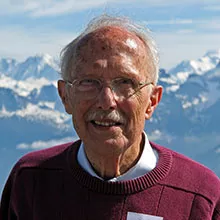
Robert S. Yeats
1931–2021
Robert S. Yeats, Professor Emeritus of Geology, died December 5 at the age of 90. Born in 1931 in Florida, he received a Bachelor’s degree from the University of Florida and Master’s and Ph.D. degrees from the University of Washington. Bob, as he was known to his friends, joined Oregon State University in 1977. He served as chair of the Department of Geology from 1977 to 1985 and retired in 1997. Bob coauthored The Geology of Earthquakes, the only textbook to address earthquake science from a geological perspective. In the late 1980s, Bob and colleagues organized a workshop to explore the seismic hazard posed by the Cascadia subduction zone, well before the threat to the Pacific Northwest was widely recognized. In 2006, Oregon State established the R.S. Yeats Professorship in Earthquake Geology and Active Tectonics to honor Bob's long career and his many contributions to science and society. See Robert S. Yeats to read more.
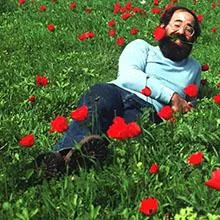
Barry F. Sherr
1944–2021
Professor Emeritus Barry Sherr passed away at the age of 77. Barry was a marine microbiologist in CEOAS from 1990 until his retirement in 2012. Along with Professor Emerita Evelyn (Ev) Sherr, his wife and closest scientific collaborator, Barry led a productive career studying microbial organisms and their contributions to elemental cycles and food webs—both in Oregon’s coastal upwelling system and the Arctic Ocean. During his time at Oregon State, he and Ev participated in several multi-national Arctic projects, including the Arctic Ocean Section (AOS) and the Surface Heat Budget of the Arctic Ocean (SHEBA). He worked closely with Distinguished Professor Emerita Patricia (Pat) Wheeler, as well as many accomplished scientists at Woods Hole Oceanographic Institution, University of Rhode Island, and other institutions. See Barry Fred Sherr to read more.
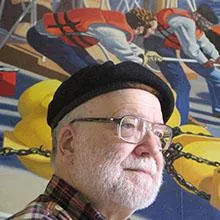
Bob L. Smith
1933–2020
Robert L. “Bob” Smith, physical oceanographer and professor emeritus, passed away at the age of 84. Bob was part of CEOAS since nearly its beginning, as a graduate student and early investigator of coastal upwelling. He, Chris Mooers, Curt Collins and Dale Pillsbury were pioneers in using moored current measurements to study currents over the continental shelf. Bob spent nearly his entire career at OSU, aside from a NATO postdoc at NIO in England and a two-year stint at the Office of Naval Research in Washington D.C. from 1969 to 1971. He was a leader in the NSF-funded Coastal Upwelling Experiment (CUE) in 1972-1973 off Oregon, and follow-on experiments off Northwest Africa and Peru. See Robert L. Smith to read more.
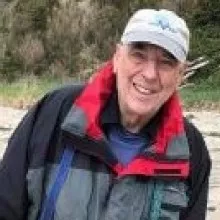
James R. Pease
1937–2020
James Robert Pease was born in Halifax, Vermont to Jessie (née Dean) and Merle Pease, and was the middle of three children. He graduated from Turners Falls High School, where he was class vice president, president of the French Club, and played football, receiving injuries resulting in his famously crooked nose. James received his BA in History from the University of Massachusetts at Amherst (UMass) in 1960, and taught high school English in Granby, Massachusetts and Brattleboro, Vermont. He later returned to UMass and obtained an M.S. and then a Ph.D. in Resource Planning in 1970 and 1972, respectively. James and his family moved to Corvallis Oregon in 1972, as James had received a faculty position at Oregon State University. James spent 25 years at OSU and achieved the rank of tenured professor in the Geosciences Department, where he taught graduate-level courses in land use planning and natural resource management, with a particular focus on land use planning for agricultural and timber lands, and environmental impact analytical methodology. See James Pease to read more.
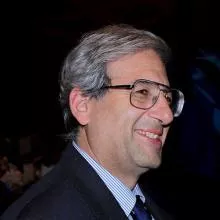
Michael H. Freilich
1954–2020
On August 5, 2020, the Earth Sciences community lost a passionate advocate for satellite remote sensing of the Earth. Michael Freilich died peacefully in his home in Kensington, Maryland, at the age of 66 after a gallant nine-month battle with pancreatic cancer. He had retired in February 2019, just nine months before his cancer diagnosis, after a distinguished career working more than 35 years for the National Aeronautics and Space Administration (NASA) and in academia at the College of Earth, Ocean, and Atmospheric Sciences at Oregon State. He will be remembered for his intellect, scientific accomplishments, and deep strategic thinking, as well as for his integrity, wit, and generosity of spirit. See Michael H. Freilich Memorial Fund to read more.
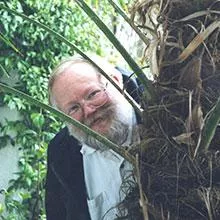
John D. Stanley
1956–2020
John Stanley passed away quietly after a four-month battle with pancreatic cancer. He was surrounded by family, compassionate help and a fitting assortment of computers, radios and electronic gizmos. John was a long-term core member of CEOAS since 1991, serving as an assistant administrator in computer and camera technology. He was instrumental in developing a suite of optical measurement approaches to observe nearshore phenomena. In addition to his career, John served in the Civil Air Patrol, achieving the positions of Major and Lieutenant Colonel. In ARES, Amateur Radio Emergency Services in Oregon, John helped facilitate communications in search and rescue training and missions. He has assisted in training for Oregon’s local ARRL, American Radio Relay League. John has also served Northwest Hills Community Church in sound and video ministry. See John Stanley to read more.
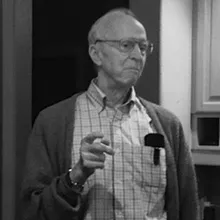
James W. Deardorff
1928–2014
Jim was the middle of three children born in Seattle to Ralph and Mary Deardorff. He was raised in Portland and graduated from Lincoln High School, after which he completed his freshman year at Reed College and then transferred to Stanford to participate in an NROTC scholarship. He spent his fourth year at UCLA studying all the prerequisites for graduate meteorology. After serving 3 years in the Navy he studied graduate meteorology courses at University of Washington, where he received his Ph.D. in 1959. After working on an air-sea interaction project at U of W, he obtained a job at the newly established National Center for Atmospheric Research (NCAR) in Boulder, CO in 1962. In 1978 he left NCAR with his family for the Department of Atmospheric Sciences at Oregon State University, where he was a research professor until taking early retirement in 1986. See James W. Deardorff to read more.